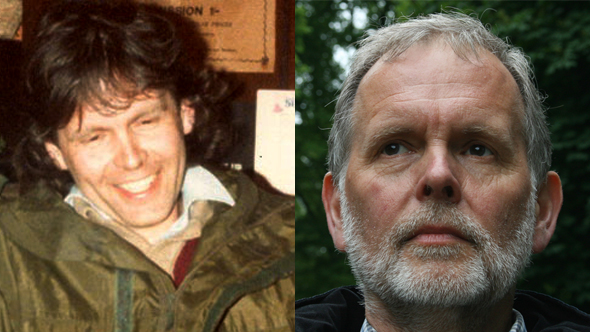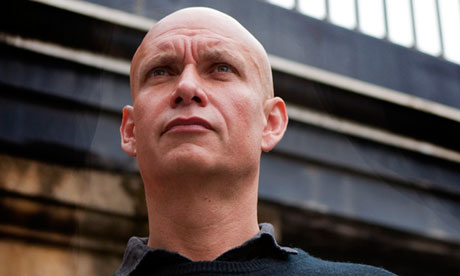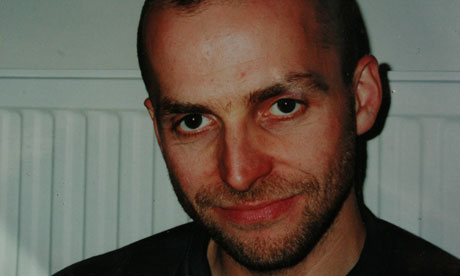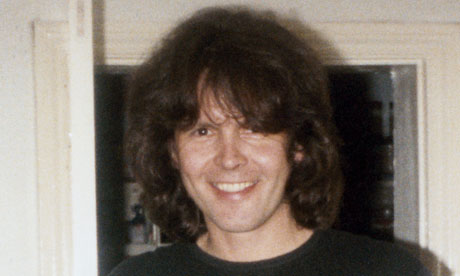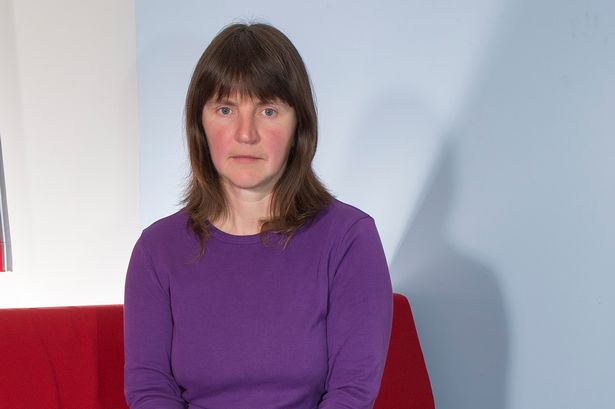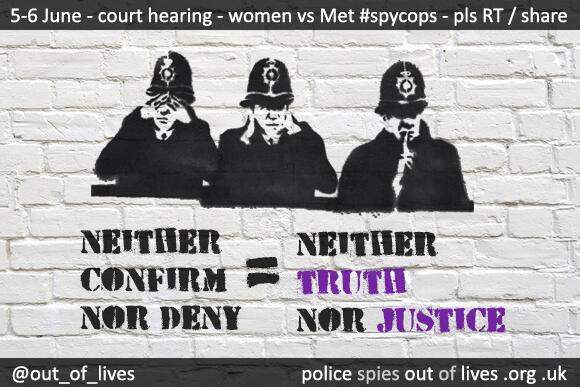More than a dozen women who were deceived into relationships with undercover police officers are known to be bringing cases against the Metropolitan Police. Last week, the first case was settled.
Jacqui was a 22 year old animal rights activist in 1984 when she met Bob Robinson, ten years her senior. They lived together for several years and had a son. Robinson was actually police officer Bob Lambert who knew that he would abandon his child as a toddler. Jacqui is certain that Lambert kept tabs on her after he left. Nonetheless, he had no contact, paid no maintenance.
After Lambert was outed by activists in 2011, he issued an apology. It mentions another partner, Belinda Harvey, but not Jacqui with whom he had a much more involved relationship. Lambert’s children with his wife had both died, yet he had not contacted Jacqui to warn her to get her son tested and treated.
Undercover officers went to elaborate lengths to ensure they weren’t suspected after they left. It was essential to maintain the vulnerability of campaigns to future infiltrators. The most powerful trick in the spies’ spellbook was the ignorance of their targets. Put simply, nobody would believe that they did it. So they would feign mental breakdown over a period of months and disappear to get their heads together, never to be seen again.
If we maximise the benefit of the doubt for Bob Lambert we might say he couldn’t have dropped a one-line card to Jacqui to warn of their son’s medical risk as it would have compromised the undercover method. This excuse evaporates once he was outed. If he had any concern for her and their son he would have run to their door. But still he did not tell Jacqui, a decision that could have cost their son his life.
Jacqui only found out the truth by chance eight months later, seeing it in a newspaper. She described it as ‘like being raped by the state’ and has since been receiving psychiatric care. She also says that, had she not stumbled across the truth and made all the effort to find Lambert, she believes he would have taken the secret with him to his grave.
When her son was young she initiated a bid to have him adopted by her new partner. Getting a child adopted without a still-living parent’s agreement isn’t easy. Adoption services made efforts to find him but their report says
I made several attempts including letters and telephone inquiries to contact Mr Robert Robinson… but I was unsuccessful. An informant, Mrs Moseley who shared the same flat with him at Nightingale Estate, Hackney, East London, told me that Mr Robinson’s whereabouts are unknown. She maintained he is unlikely to surface in the future because of his intense political involvement with the Animal Liberation Movement activities.
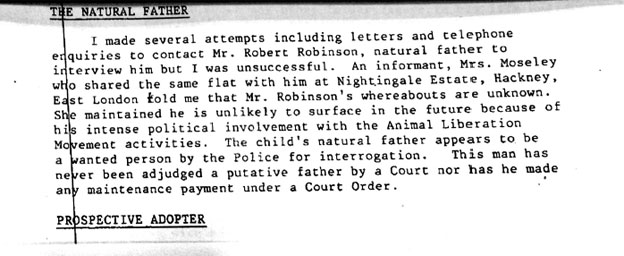 The address Lambert lived at appears to have been demolished several years before ‘Mrs Moseley’ made her comment. Jacqui is convinced that this person was a Special Branch plant. The name, Moseley, may well be a warped joke on their part. How it must have seemed to Special Branch that all the loose ends were being tied up.
The address Lambert lived at appears to have been demolished several years before ‘Mrs Moseley’ made her comment. Jacqui is convinced that this person was a Special Branch plant. The name, Moseley, may well be a warped joke on their part. How it must have seemed to Special Branch that all the loose ends were being tied up.
Jacqui’s new partner died not long after, the second dad her son had lost in his seven years. She returned to bringing him up as a single parent, a few miles from where the well-remunerated Lambert worked.
Considering the full cost of bringing up a child plus her ongoing care, even on purely financial terms the payout of £425,000 seems paltry.
The Metropolitan Police said
From the outset we have dealt with this lengthy case with professionalism and sensitivity, completely understanding the gravity of the circumstances.
Jacqui brought her case in 2012. Numerous other women brought theirs earlier. The Met refused to even admit that Lambert had been an undercover officer until two months ago despite the fact that, as Jacqui said, there was the absolute proof in the form of six foot of Lambert’s DNA walking round. The Met still won’t admit most of the well-established officers such as John Dines and Mark Cassidy were, in fact, undercover officers.
The settlement is testament to the tenacity of Jacqui and her lawyer Jules Carey. It comes despite the unprofessional, insensitive attitude of the Met. No amount of money will buy back Jacqui’s capacity to trust. Looking beyond that to a wider view of justice, as she said, money is an irrelevance.
There is the money, but there is no admission by the police that what they did was wrong, there is no meaningful apology and most importantly there are no answers.
But the legal system effectively forced her to take the money. If she had continued to court and won, but the damages awarded were below the police’s previous £425,000 offer, then she would have had to pay the police’s legal bill.
The women whose cases are still ongoing are likely to get lower amounts as they did not unwittingly have children to raise. This means the police costs could even exceed the damages awarded. In that position who could afford to push onward for disclosure and justice?
The claimants – many of whom would surely forego any money if they could have answers – will have to take the money (then vicious newsmedia comments sections will fill up with accusations of them being gold-diggers all along).
Effectively, the police are buying their way out of a damning court case. Those in charge retain their promotions and pensions whilst those they abused are left to rely on their own fortitude to repair the damage that was done to them for having the temerity to campaign for a fairer world.
As eight other women bringing similar cases reiterated
we have no reason to believe that these abhorrent abuses have stopped, or that the police acknowledge their actions are wrong, and that they must change.
There can be no excuse for undercover officers having sexual relationships whilst in their undercover persona. It is already illegal in Germany and there is no detrimental effect to German society. After all the damage done and, at long last, admissions from the police of it, it is surely time to change the law.

